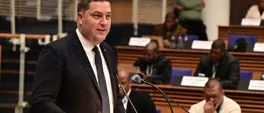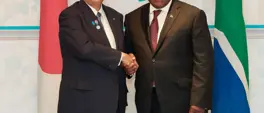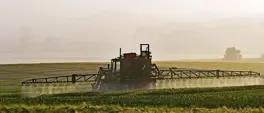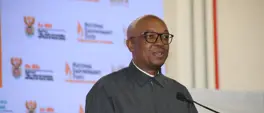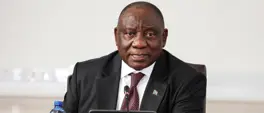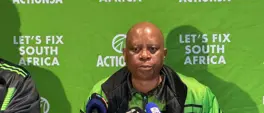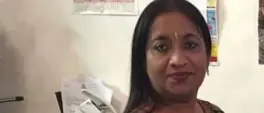MALAIKA MAHLATSI | Rand Water’s System 5A a light at the end of Gauteng’s water security crisis
Malaika Mahlatsi
22 August 2025 | 10:43Malaika Mahlatsi explains the wider implications of the launch of System 5A, Rand Water's bulk water purification plant in Vereeniging.
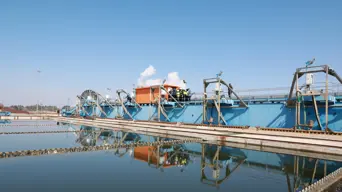
President Cyril Ramaphosa at the launch of Station 5A Water Purification Plant in Vereeniging on 8 August 2025. Picture: @DWS_RSA/X
In my MSc Water Resource Science dissertation titled Analysing the equity dimensions and governance drivers of water security challenges in Hammanskraal, City of Tshwane, South Africa, undertaken at the Institute for Water Research at Rhodes University, I explore the governance drivers that are exacerbating the water insecurity challenges confronting the said study area and South Africa, broadly.
Our country is semi-arid and experiences biological water scarcity.
This is a situation where a region's water resources are insufficient to meet the demands of its population and ecosystems, and is the result of factors including exceeding water demand (driven by various factors, including population growth, increased agricultural activities, and industrial development), uneven rainfall distribution across various parts of the country, and insufficient water supply (when the natural water resources, like rivers, lakes, and groundwater, cannot provide enough water to meet the needs of a given area).
But an even greater factor in South Africa’s water security crisis is poor watergovernance, driven mainly by the failure of municipalities to maintain and improve water infrastructure. The amount of water that our country loses as a direct result of this problem is astounding.
Research indicates that between 37% and 47% of municipal water is lost before reaching consumers – translating to an estimated R7 billion in lost revenue for municipalities annually.
This non-revenue water is lost through leaks, illegal connections, and meteringinaccuracies. In Gauteng, the most populous and industrial province in South Africa, failure by the state to plan for population growth and industrial development has been an especially troubling factor, one that has resulted in the province’s persistent water challenges that are ripping communities like Hammanskraal and many other townships asunder.
Like many other water scientists, I believe that if water governance can be improved, the effects of biological factors such as climate change can be better mitigated. South Africa should not have the level of water insecurity that it has.
But two weeks ago, we finally saw light at the end of the long tunnel with the launch of System 5A, yet another construction feat by bulk water utility, Rand Water. Rand Water is executing its augmentation programme through the construction of the said water purification facility.
System 5A will add 600 million litres a day to Rand Water’s capacity, of which 150 million litres a day is already in use, with the full commissioning and handover expected by the end of December 2025. This water will be purified at the bulk water purification plant, which can now purify up to 1.2 billion litres of water a day.
Of significance about System 5A is that it will ensure that there is enough water in Gauteng and the parts of surrounding provinces, including Mpumalanga and the North West - areas that have been water-stressed for decades, despite being South Africa’ industrial and economic heartland.
The implications of System 5A are significant and go beyond ensuring water availability until 2031. The economy of South Africa is heavily reliant on water resources, with every industry in the country using water.
While some sectors like agriculture, manufacturing and mining have a more obvious reliance on water, even seemingly water-independent industries like finance, logistics and ICT rely on water for essential infrastructure and employee wellbeing.
Water is also a crucial input for various industries, including energy production. It is not a stretch to say that the entirety of the country’s GDP relies on water. This aligns with a 2023 report by the United Nations Food and Agriculture Organization (FAO), which indicates that the total economic value of water and freshwater ecosystems is estimated to be US$58 trillion (or just over R1 quadrillion) annually, which is equivalent to 60 percent of global gross domestic product.
Given that South Africa’s economy is in dire straits, improvement in water infrastructure will go a long way in ensuring that at least this one critical input is available. As indicated, adequate and reliable water supply supports various industries, including agriculture, mining, and manufacturing.
These industries are major contributors to the outh African economy and to job creation.
In the context of South Africa, water security is also a question of socio-economic justice. Access to clean and affordable water and sanitation services is crucial for reducing poverty and inequality.
Lack of access disproportionately affects marginalised communities, something that I became acutely aware of in my study of Hammanskraal. It impacts health and well-being, education, and the capacity of working-class people to generate sustainable livelihoods.
This is why the story of System 5A must be understood as being more than just about water security, but about socio-economic justice and the very future of South Africa’s democratic project, at the centre of which is equality. Water availability is crucial to alleviating the triple challenges of poverty, unemployment and inequality. This is why the story of System 5A is important for all of us.
Malaika Mahlatsi is a geographer and researcher at the Institute for Pan African Thought and Conversation and a PhD in Geography candidate at the University of Bayreuth in Germany.
MALAIKA MAHLATSI: Climate change caused by the rich, but the poor pay the price
Trending News
More in Opinion

22 August 2025 10:12
JUDITH FEBRUARY & CHRIS OXTOBY | Legal Sector Code controversy must not be ignored

21 August 2025 17:02
PROF ZONDI: Despite early controversy, Ramaphosa’s National Dialogue signals a path forward

20 August 2025 12:30
MALAIKA MAHLATSI | The National Convention did not change my mind about the National Dialogue
